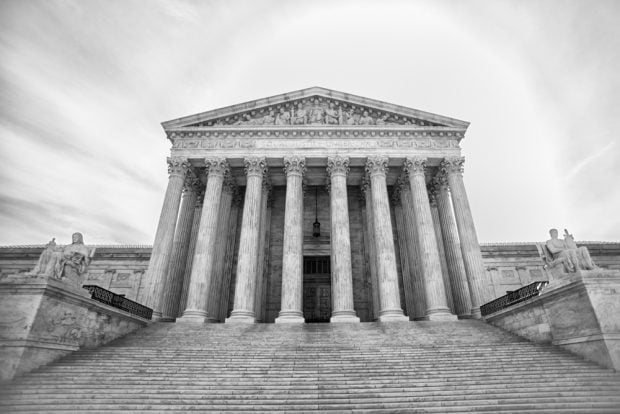 U.S. Supreme Court. (Source: Shutterstock)
U.S. Supreme Court. (Source: Shutterstock)
If you think that regulatory agencies have too much power in interpreting laws, then you will be happy about what I am about to tell you. On Monday, the Supreme Court decided to hear a case next year that could dramatically limit an agency's flexibility to interpret statutes. Between this and the Court's decision to examine the constitutionality of the CFPB's funding mechanism, next year is shaping up as one of the most important for credit unions to follow the Supreme Court in years.
In 1984, the Supreme Court decided Chevron USA Inc. v. Natural Resources Defense Council, Inc, in which it determined how much deference agencies should be given when interpreting and implementing ambiguous statutes. Under this framework, when a regulation is challenged, the Court must first determine whether the statute it's interpreting is ambiguous. If so, the Court is "obligated to accept" the agency's position so long as its interpretation is reasonable.
Recommended For You
Credit unions have been both helped and hindered by this approach. For instance, in 1999, the Court struck down an NCUA regulation permitting common-bond credit unions to accept multiple common-bond groups. In this case, the Court rejected the NCUA's interpretation that the Credit Union Act was ambiguous. Fast forward to 2019, however, when the Court of Appeals for the District of Columbia upheld the NCUA's regulation adopting its expansive interpretation of what constitutes a "well-defined local community" for purposes of charter expansions (Am. Bankers Ass'n v. Nat'l Credit Union Admin, 2019; Nat'l Credit Union Admin. v. First Nat'l Bank & Trust Co, 1998). In making this ruling, the Court of Appeals decided that the term "local" was vague enough to defer to the agency's interpretation.
These are just two examples of several to which I could point exemplifying how this seemingly arcane legal construct impacts your credit union operations. For example, if not all of your mortgage originators are classified as exempt employees, or if you ensure that your credit union extends Regulation B's protections to potential loan applicants, you can blame Chevron deference.
So, what's the big deal, you ask? If you're a legal dinosaur like me – and an increasingly large number of federal judges – you are already uncomfortable with the powers exercised by agencies as opposed to Congress and the courts. Since Chevron's adoption, critics, including Justices Gorsuch and Thomas, argue that courts have become too willing to conclude that a statute is ambiguous and defer to any agency interpretation.
This brings us to Loper Bright Enterprises v. Raimondo. In this case, the Court will consider whether the U.S. Court of Appeals for the District of Columbia properly deferred to an agency's interpretation. Specifically, companies are challenging a regulation adopted by the National Marine Fishery Service requiring fishing companies to pay for observers who monitor compliance with fishery management plans. Loper Bright Enterprises took the aggressive step of asking the court to overrule the Chevron deference test, consigning it to the legal dustbin.
To me, this change cannot come soon enough. Every year, thousands of credit union advocates descend on Capitol Hill advocating for changes to the law. However, the way the system has evolved, they should be spending most of their time talking to unelected bureaucrats who, for better or worse, change interpretations of long-standing laws to reflect the latest administration's preferences.
Not only does this make it more difficult for credit unions to figure out how best to comply with legal requirements; it also lets Congress off the hook. Our elected representatives can vote in favor of vaguely worded statutes proclaiming they are in favor of borrowers receiving "qualified mortgages" and outlawing "abusive and deceptive practices." However, this leaves the heavy work of actually deciding what these terms mean to bureaucrats who are not accountable to the public in the same way as legislators. In addition, it should be a court's job to interpret a law and an agency's job to implement it. Instead, we have a system in which the CFPB gets to act as judge, jury and executioner.
In short, Chevron deference has outlived its usefulness. It's time to give more responsibility back to Congress and the Courts so that regulated entities better know to whom they are accountable and under what circumstances.
 Henry Meier, Esq.
Henry Meier, Esq. Henry Meier is the former General Counsel of the New York Credit Union Association, where he authored the popular New York State of Mind blog. He now provides legal advice to credit unions on a broad range of legal, regulatory and legislative issues. He can be reached at (518) 223-5126 or via email at [email protected].
© Touchpoint Markets, All Rights Reserved. Request academic re-use from www.copyright.com. All other uses, submit a request to [email protected]. For more inforrmation visit Asset & Logo Licensing.






